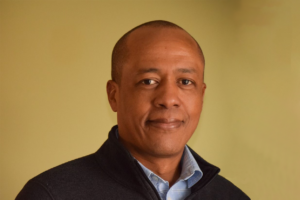AMES, Iowa—Walter Suza wants to do what George Washington Carver did — feed the hungry.
And Suza, adjunct associate professor in Iowa State University’s Department of Agronomy and the new George Washington Carver Endowed Chair, has proven he knows how to do it.
Suza’s role as chair started Aug. 15, following Andrew Manu, professor emeritus of agronomy, who held the position since 2009.
“I expect Dr. Suza will do great things in this position,” said Mary Wiedenhoeft, interim department chair and Morrill Professor in the Department of Agronomy. “His passion for fighting food insecurity will be an asset to the continued success of the George Washington Carver Endowed Chair position and the expansion of the agronomy department.”
Suza began applying lessons from his youth to solve hunger when he worked for the World Food Program in Angola and UNICEF in Zimbabwe in the 1990s.
“When I was a child in rural Tanzania, I experienced hunger in school,” Suza said. “Education helped me rise above inequity, yet if Africa University had not provided me with financial aid, I would not have completed my undergraduate education. My undergraduate education at Africa University convinced me that education is a powerful tool to fight hunger. With a college degree, I was able to find employment with the United Nations.”
In his roles with the World Food Program and UNICEF, Suza worked in food security assessment, mapping vulnerable households and coordinating food aid to households affected by civil war and drought, areas that were critical to achieving his goal of feeding the hungry.
Just like George Washington Carver did.
“It became apparent to me during my employment with WFP and UNICEF that limited access to education contributed to food insecurity,” Suza said. “Today, I am educating the next generation of agronomists who will play a greater role in ending hunger in the world.”
Suza earned his bachelor’s degree in agriculture and natural resources from Africa University in Zimbabwe, his master’s degree in agriculture with an emphasis in soil science from Murray State University and his doctorate in agronomy with an emphasis in plant molecular biology from the University of Nebraska-Lincoln.
He came to Iowa State in 2011 to develop courses for the Distance Master’s in Plant Breeding program. He went on to serve as director of the Plant Breeding e-Learning in Africa Program for eight years.
Suza teaches courses on genetics and crop physiology for agronomy majors. He is also increasing access to free educational resources for both Iowa State students and the rest of the world. These resources have reached more than 86,000 people all over the world.
“George Washington Carver was a pioneer here as a student and faculty member, beginning in 1891, and left Iowa State for the Tuskegee Institute to further reach his goals of science and service,” said Daniel J. Robison, holder of the endowed dean’s chair in the College of Agriculture and Life Sciences. “Walter Suza, who is here at Iowa State to inspire the next generations of great students, following in Carver’s footsteps. Suza is in a wonderful position to honor and expand upon Carver’s legacy and help move our college further forward. I know he will accomplish great things.”
Additionally, Suza is interested in empowering farmers to produce more and healthier food.
Just like George Washington Carver did.
Carver served producers and consumers by improving soil technology and developing novel uses of common agricultural products.
Like Carver, Suza’s research on plant sterols is aimed at serving all farmers with healthier food crops that are more resilient to limited water supplies due to the changing climate.
“I dream of a world where every child has access to sufficient and nutritious food,” Suza said. “I dream of an America where every child has access to lunch in school regardless of their socioeconomic status.”
Suza said he hopes to honor Carver with his work as the endowed chair.
“It’s not about me, really,” Suza said. “It’s an honor to be associated with Carver. I’ll never understand what it feels like to have gone through all that he did — he was born a slave; he faced racism, even here in Iowa. We need to honor him. We need to tell his story.”


(contributed press release, ISUCALS)









